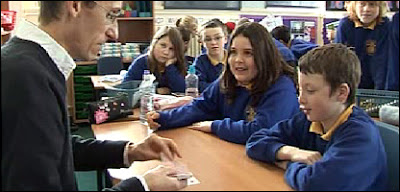
I saw Jonathan Hancock on Newsround this week. He is a World Memory Champion. He has been teaching his Year 6 pupils to learn through memory stories. They learn facts, names, words etc through a story; the example they showed was of saying something in Japanese. To remember something quite challenging they make a story out of the segments that make up the word or sentences, the example was of Sam was visiting someone, but knocked his knee etc (where Sam and knee were parts of the word), and they performed actions to help as well. This not only appeals to children but is also an easy way to remember things. Sometime he uses pictures.
This has been so successful that other schools are being encouraged to follow his lead. There are many memory methods for example mnemonics are often used, especially in science (MRS GREN). For example when doing MRS GREN with a Year 4 class I knew I wasn’t missing out any of the 7 features of living organisms because I filled out all of MRS GREN. Obviously you need to know what the features are but the first letter of each word gives you a prompt and is much easier than remembering all 7 individually and together.
When I was at school the army visited and tried the memory game with us. They put several items out on a table, you have 1 minute to look at them and then you have to remember all of the things that are there. They let us try it first and then they showed us if you make it into a story you can remember it easily. E.g. I left the house and remembered my KEYS, walking down the street I saw some GUM on the floor, avoiding it I stepped on a 10p which I put in my pocket when I found a LIST of food shopping I had to get etc….
I think they are some great ways to learn things, but as a teacher you could spend all your time thinking up these games and end up never teaching them anything. I think it would be more beneficial to teach them how to devise these memory methods and so they could use them when revising etc especially later in life when they are doing GCSE’s etc.
Read the article here
(Picture is from newsround's website of Mr Hancock telling the children a story about the order the playing cards come in to help them remember....although one may ask why they need to know such a thing?!!)

No comments:
Post a Comment